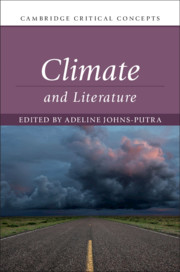Book contents
- Climate and Literature
- Cambridge Critical Concepts
- Climate and Literature
- Copyright page
- Contents
- Illustrations
- Contributors
- Acknowledgements
- Introduction
- Part I Origins
- Part II Evolution
- Chapter 7 Weather and Climate in the Age of Enlightenment
- Chapter 8 British Romanticism and the Global Climate
- Chapter 9 The Literary Politics of Transatlantic Climates
- Chapter 10 Climate and Race in the Age of Empire
- Chapter 11 Ethereal Women: Climate and Gender from Realism to the Modernist Novel
- Chapter 12 Planetary Climates: Terraforming in Science Fiction
- Chapter 13 The Mountains and Death: Revelations of Climate and Land in Nordic Noir
- Part III Application
- Bibliography
- Index
Chapter 10 - Climate and Race in the Age of Empire
from Part II - Evolution
Published online by Cambridge University Press: 31 July 2019
- Climate and Literature
- Cambridge Critical Concepts
- Climate and Literature
- Copyright page
- Contents
- Illustrations
- Contributors
- Acknowledgements
- Introduction
- Part I Origins
- Part II Evolution
- Chapter 7 Weather and Climate in the Age of Enlightenment
- Chapter 8 British Romanticism and the Global Climate
- Chapter 9 The Literary Politics of Transatlantic Climates
- Chapter 10 Climate and Race in the Age of Empire
- Chapter 11 Ethereal Women: Climate and Gender from Realism to the Modernist Novel
- Chapter 12 Planetary Climates: Terraforming in Science Fiction
- Chapter 13 The Mountains and Death: Revelations of Climate and Land in Nordic Noir
- Part III Application
- Bibliography
- Index
Summary
This chapter outlines the ways in which historical traditions of climatic medicine influenced nineteenth- and early twentieth-century colonial discourses. It further examines three authors’ engagements with and reaction to these discourses, in both fictional and non-fictional literatures of empire. Rather than simply recapitulating pro-imperial uses of climate science, works by Richard Burton, Joseph Conrad, and Rudyard Kipling all ‘map’ race and climate in a way that reflects the ambivalences and contradictions at the heart of colonial discourse. Further, this chapter analyses the imaginative potential provided by the structures of fiction for authors like Conrad and Kipling to grapple with concepts of chronic disease, bodily transformation, adaptation, and degeneration in Africa and India.
Keywords
- Type
- Chapter
- Information
- Climate and Literature , pp. 163 - 178Publisher: Cambridge University PressPrint publication year: 2019

